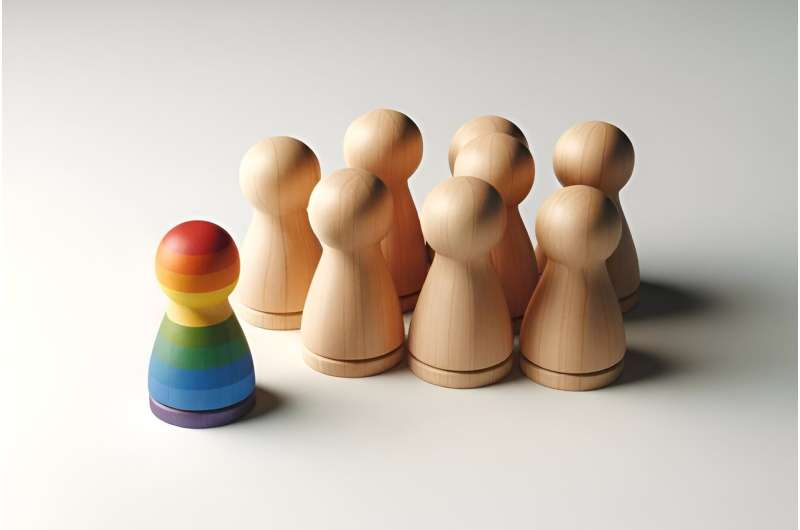This article has been reviewed according to Science X's editorial process and policies. Editors have highlighted the following attributes while ensuring the content's credibility:
fact-checked
peer-reviewed publication
proofread
Sexual minorities experience more exclusion in everyday situations, finds study

Lesbian, gay and bisexual people experience exclusion more frequently than heterosexual people. This is the finding of a recent study published in the Personality and Social Psychology Bulletin by researchers from the University of Basel and the RPTU University of Kaiserslautern-Landau.
According to the study, people who are perceived as less gender-conforming are more frequently socially excluded. This could also affect heterosexual people if they deviate from traditional gender roles.
In three studies with a total of more than 3,200 participants in Germany and the U.S., the research team investigated the experiences of exclusion of sexual minorities.
The first study comprised a nationally representative sample in Germany with 2,609 participants. The researchers asked about experiences of social exclusion among sexual minorities and heterosexual people.
In the second study, the research team followed 467 people in their everyday lives for 14 days and asked them to document their experiences of exclusion using a smartphone app.
The third study used 10,760 judgments about the likelihood of exclusion from different people based on perceptions of their sexual orientation and gender role conformity. A total of 141 respondents were presented with photos, videos, or voices of lesbian, gay, and heterosexual people. On a 7-point scale, the respondents had to rate the likelihood that these people would be ostracized.
"Sexual minorities experience many forms of violence and discrimination," explains Christiane Büttner, social psychologist at the University of Basel, commenting on the results of previous studies. "However, unlike overt discrimination, which is visible and can be challenged, exclusion can be subtle and therefore difficult to recognize and prove."
This is precisely what makes it difficult for those affected to address the situation or even demand support. Exclusion can be more painful than other forms of discrimination because it attacks the basic needs for belonging and self-esteem. This is because people are social beings and strive to belong—they find security and affirmation in social groups.
In terms of evolutionary psychology, belonging is essential for psychological well-being. If this need remains unfulfilled in the long term, feelings of isolation, hopelessness and reduced self-esteem arise. Even serious psychological problems such as anxiety disorders, depression and suicidal tendencies can be the result of social exclusion.
"The consequences can be devastating, especially if those who are excluded are aware that they are being excluded because of an unchangeable, stable characteristic, such as their sexual orientation," emphasizes Selma Rudert, social psychologist at RPTU.
Subtle forms of discrimination little studied so far
Previous studies have mainly focused on more obvious forms of discrimination against sexual minorities. These include direct verbal abuse, for example. "Subtler forms have been studied less so far. We wanted to close a gap here," says Büttner.
The result: Lesbian, gay and bisexual people experience exclusion more frequently than heterosexual people. According to the researchers, each person experiences an average of two to three experiences of exclusion within a 14-day period, with members of sexual minorities experiencing one more exclusion situation on average.
LGB people experience exclusion in various areas of daily life, the researchers outline the overall picture: for example, they are excluded from social activities at work or ignored and marginalized by classmates or teaching staff at school or university. They may also not be invited to events and their contributions are ignored in discussions.
Deviating from traditional gender roles increases vulnerability to exclusion
The third study showed that more frequent exclusion is linked to gender role non-conformity. "People who are perceived as deviating from gender norms—regardless of whether they actually do or what their actual sexual orientation is—are more likely to be ostracized," explains Sven Kachel, psychologist at RPTU.
"Even if the respondents did not know the sexual orientation of the people being judged, they rated those people they perceived as less gender-conforming as more likely to be ostracized."
This means that even a heterosexual man, for example, who is perceived as less masculine, runs the risk of experiencing exclusion as a subtle form of discrimination. Violations of traditional gender norms are thus sanctioned and these norms remain in place.
According to the researchers, this has serious consequences, as adherence to gender norms affects the psychological well-being of a significant proportion of the population.
Raising awareness
Overall, the results suggest that more proactive measures are needed to raise awareness of exclusion as a subtle form of discrimination in all areas of society, according to the researchers. One approach: As part of Pride Month, attention is drawn to the concerns of the LGBTQ+ community with the help of various campaigns.
"Organizations and educational institutions should also establish specific programs and trainings to raise awareness and promote an inclusive environment," recommend the authors of the study.
At a societal level, campaigns to promote diversity and inclusion could help to break down stereotypes and prejudices.
More information: Christiane M. Büttner et al, Ostracism Experiences of Sexual Minorities: Investigating Targets' Experiences and Perceptions by Others, Personality and Social Psychology Bulletin (2024). DOI: 10.1177/01461672241240675
Journal information: Personality and Social Psychology Bulletin
Provided by Rheinland-Pfälzische Technische Universität Kaiserslautern-Landau




















